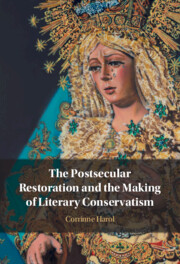Book contents
- The Postsecular Restoration and the Making of Literary Conservatism
- The Postsecular Restoration and the Making of Literary Conservatism
- Copyright page
- Contents
- Acknowledgments
- Introduction
- Part I Political and Fictional Relations
- Chapter 1 Faith
- Chapter 2 Indulgence
- Part II Postsecular Literary Experiences
- Part III Political Agents and Novel Forms
- Bibliography
- Index
Chapter 1 - Faith
Impersonating Faith, or How We Came to Have Faith in Fictions
from Part I - Political and Fictional Relations
Published online by Cambridge University Press: 22 June 2023
- The Postsecular Restoration and the Making of Literary Conservatism
- The Postsecular Restoration and the Making of Literary Conservatism
- Copyright page
- Contents
- Acknowledgments
- Introduction
- Part I Political and Fictional Relations
- Chapter 1 Faith
- Chapter 2 Indulgence
- Part II Postsecular Literary Experiences
- Part III Political Agents and Novel Forms
- Bibliography
- Index
Summary
“Faith: Impersonating Faith, or How We Came to Have Faith in Fictions” analyzes how faith was taken up by Reformation theologians, by political theorist Thomas Hobbes, and by Aphra Behn in her earliest prose fiction. The chapter takes up “faith” at a key point in its history, in order to account for what it meant before secularization and for what its role would be in a secular epistemology, politics, and culture. It analyzes Thomas Hobbes and Aphra Behn in order to see how they link the idea of faith to the emergent category of fiction: In Hobbes, the political project of contract relies on fictionality for its form, while in Behn, the fictional project of the nascent novel relies on faith for its form.
- Type
- Chapter
- Information
- Publisher: Cambridge University PressPrint publication year: 2022

